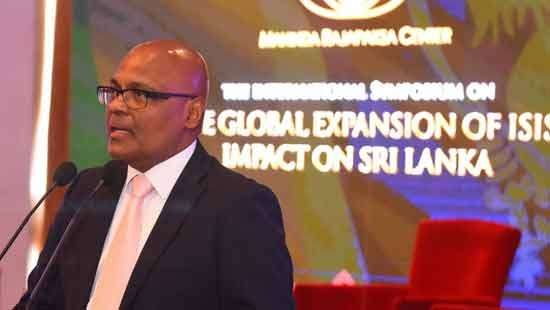An international terrorism expert yesterday blamed the failure to avert the Easter Sunday bombings on the absence of collective leadership in the country and said security and intelligence agencies should not be held responsible for the debacle.
Addressing an international symposium organised by the Mahinda Rajapaksa Centre at the Kingsbury Hotel, one of the targets of the terrorists, leading academic Prof. Rohan Gunaratne pointed out that Sri Lanka had successfully fought terrorism for 27 years.
He said the law enforcement and intelligence authorities cannot be faulted for the failure to avert the bombing incidents of April 21. Prof. Gunaratane said the leadership was divided in the country.
“The leadership was divided. There was no collective leadership, no visionary leadership. We cannot blame the Sri Lankan security and intelligence apparatus for this. Intelligence existed. It is very rarely that any country will receive such precise intelligence of an attack in the making,” he told the audience that included Prime Minister Ranil Wickremesinghe, Opposition Leader Mahinda Rajapaksa and Speaker Karu Jayasuriya.
Asserting that he saw the original intelligence reports, he said there had been information available on National Thowheed Jamaath leader Zahran Hashim, his members and the mode of attack. Besides, he said the intelligence reports even suggested that the churches would be the target of these attacks.
He pointed out that the DIG in charge of the Ministerial Security Division (MSD) informed the principal staff officers of the 225 MPs, but not the churches about an impending threat. Commenting further on the intelligence services, he said their indomitable spirit that existed before 2015 had been taken away.
He said the intelligence agencies acted like hunters waiting for persons like Zahran to come out to be hunted. “Hunters have become fishermen today. It is the failure of leadership,” he said.
Detailing a number of Islamic terrorist operations in Sri Lanka, he said there had been three such networks operating in the country having links with IS. He said the Central Province network was one of them.
“In this instance, there are 42 Sri Lankans who have travelled to Iraq and Syria beginning from January 15, 2015. The very first leader of this group was Mohamed Nizam. When he travelled, he was recruited by his brother, a man called Abu Ishak. He worked for a humanitarian agency in the United Kingdom and Tanzania. In fact, the very first Sri Lankan to travel to Iraq was Ishak. He was radicalised in the UK and later travelled to Sri Lanka where he in turn radicalised two families-his own family and his wife’s family. They travelled with their wives, children. They lived in Syria. Just six months after Nizam went to Syria, he was killed,” he said.
The other one is the eastern network or the network that was led by Zahran, who graduated from two Arabic schools in Sri Lanka. It is Kattankudi centric. They were constantly recruiting people from the eastern region. About 150 members were recruited by Zahran.
“Another ISIS centric organisation emerged in the Western Province as well. They were known as Jamathei Millathu Ibraheem (JMI),” he said.











